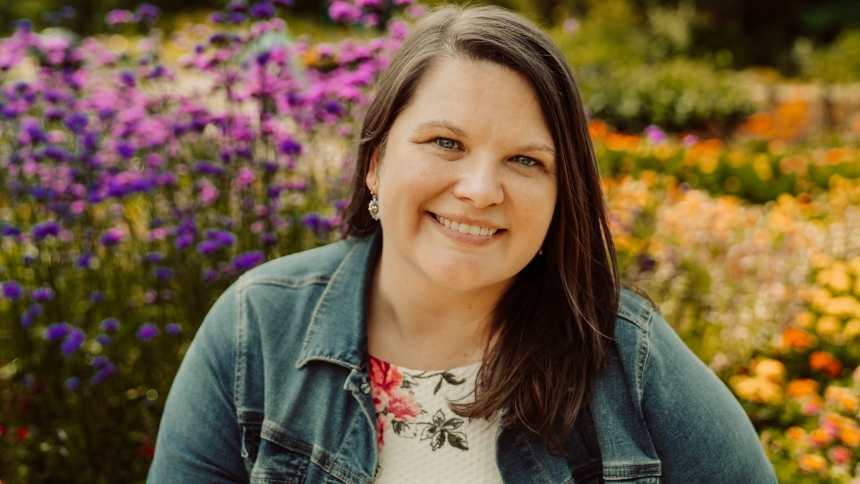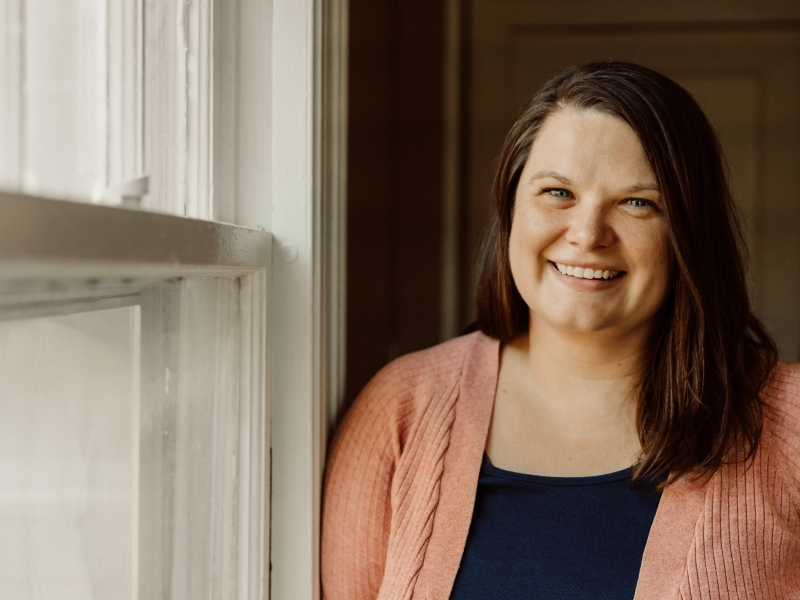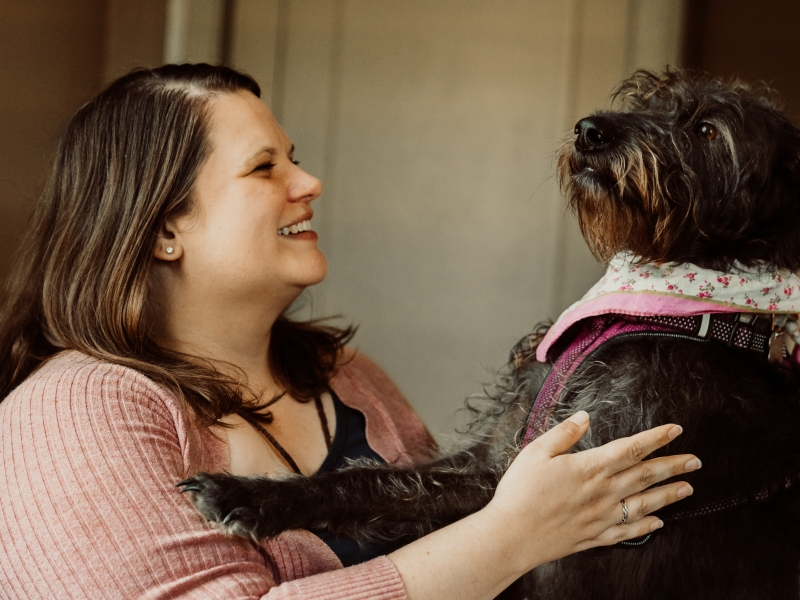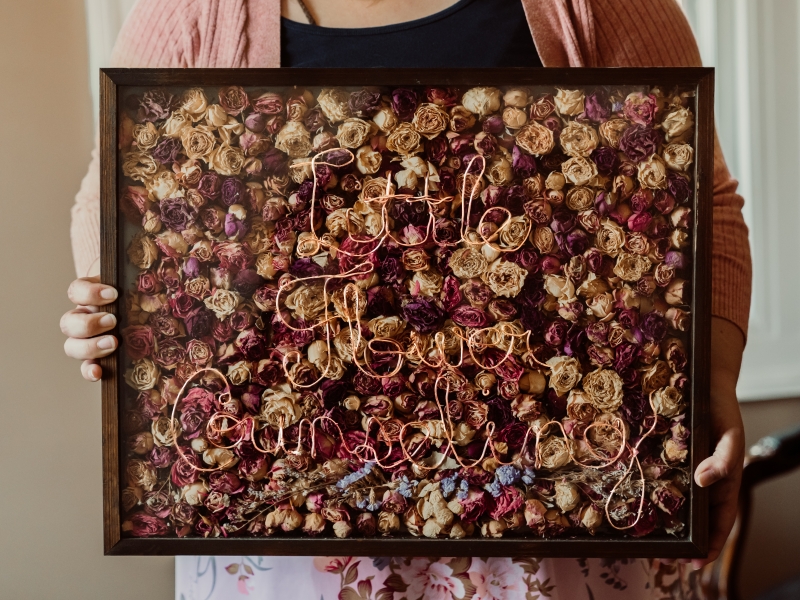
Inspired by Saint Thérèse of Lisieux, Emily McJones entered the Church in 2017, writes Stephanie Van Koevering. A few years later, her new faith — and a healing pilgrimage to Lourdes — would change everything.
It all began with flowers.
“I had heard that Saint Thérèse left roses for people,” Emily remembers, looking back on her time in graduate school, where she completed her training to become a counselor. “I was really struggling with a lot of things. And every day I got a rose, or a rose appeared, or somebody gave one to me. At the end of that week, I was visiting the Detroit Zoo. I stopped at a light and glanced to my left, and there was the Shrine of the Little Flower.”
At that moment, Emily — a committed Baptist — decided to connect with a saint for the first time. “I said, ‘Saint Thérèse, I think you want to be my friend. I think you’re trying to talk to me,’” she says. “I started developing a relationship with her.”
Emily began developing other important relationships. Living in Grand Rapids at the time, she was invited to take part in a group for young Catholic adults, which brought her into contact with the rosary. “They would do evening prayers, and then the rosary, and then they would have a talk and then social time. I kept thinking, ‘Wow, this is really beautiful.’ I came home and googled, ‘Is it OK for Protestants to pray the rosary?’ It didn’t seem to me to be a problem, so I put together a makeshift rosary.”
Emily didn’t know she didn’t have to meditate on all the mysteries every time, so she prayed all 20 of them all the time. “I was a rosary-praying fiend,” she laughs.
At the same time, Emily’s desire to learn more about the Catholic faith grew. She threw herself into a vast array of formation activities and ultimately took the leap into the church on October 8, 2017 — the octave of Saint Thérèse.
But God had yet to bestow his greatest gift to date. “I lived with Ehlers-Danlos syndrome all my life,” Emily says. “I had rheumatoid arthritis from the age of four, and suffered from severe migraines, and even seizures. I had 20 different food allergies and celiac disorder. I was in constant, intense pain for decades.”
Although she felt the pull of a journey to Lourdes, circumstances prevented her from making the pilgrimage. “Then, in fall 2021, I was playing around on Google Flights, and I found roundtrip flights, all the way from Lansing to Lourdes, for $723 roundtrip,” she says. “But finances weren’t in the best place, and I didn’t want to be impulsive. I chose to do a nine-day rosary novena with the idea that if, at the end of the nine days, it’s the same price or less, I would buy the ticket.” At the end of the nine days, the ticket was $722 — one dollar less. Emily was on her way.
“I went to the grotto on October 1, Saint Thérèse’s feast day,” she remembers. “Hers was one of the first statues I saw when I entered, and there were all these flowers. I thanked her for her intercession, for everything. I came to the fountain and filled my water bottle, drank it down, and filled it up again. And then I went and knelt at the grotto, and I prayed.”
As Mass was beginning, however, Emily realized she had a problem. She’d forgotten her pyx and low-gluten host at her hotel. She didn’t speak French, and she couldn’t find help. “And then I just had this peace,” she says. “I felt I was supposed to be there, and that the Lord wanted to heal me there. I only needed to step out in faith and receive him. I prayed, ‘Jesus, I’m going to receive you, and if I vomit you up, I’m sorry. But I’m going to receive you.’ So, I did, and I was totally fine.”
For Emily, that small amount of gluten would ordinarily have made her violently ill, and not just in that moment. “It would have started a whole autoimmune response. There would have been a rheumatoid arthritis flare, and we’re talking weeks of misery,” she says. “And I was totally fine.”
At that point, Emily says, she became “crazy brave.” “I ate a baguette and was fine,” she says. “Then I decided to test out eggs and dairy, bringing some crème brulée back to my hotel room. I knew I had an EpiPen, Benadryl, a bathroom, and nowhere I needed to be. But none of it mattered — I was totally fine.”
In the coming weeks, Emily found her allergies had disappeared. She also soon realized she no longer needed her pain pills or her daily rheumatoid arthritis medication. “I haven’t been back to the rheumatologist since,” she says. “And even better, my eye doctor told me my vision is 20/20 and my astigmatism has gone. And there had been some scarring on my optic nerve from the rheumatoid arthritis, and that has vanished, too.”
For Emily, who is now pain-free and able to eat and see whatever she likes, the world has changed. Today, she operates a faith-based counseling center, Little Flower Counseling, in downtown Lansing. She works with patients of all backgrounds, ages, and experiences. And best of all, she remains connected with God during daily Mass at her home parish, Saint Mary’s Cathedral.
“It’s unbelievable,” she says. “Sometimes I just think, ‘Okay, God. Surely, you’re done showering me with grace, because it’s not even fair that I’ve gotten this much good stuff. But he’s taught me how much he loves us, and he always wants to give good gifts. And there’s never a point where he says, ‘OK, that’s enough.’ He loves us unconditionally. With God, there’s never enough.”
• Footnote: On a separate note, please pray for Emily who is currently part of a federal lawsuit seeking to overturn Michigan’s law that purports to ban “conversion therapy” for minors.
The suit, which includes as co-plaintiff a Catholic Charity agency in the Diocese of Lansing, alleges that the state’s ban prevents counselors from taking a cautious, science-backed approach when counselling minors regarding issues related to sexual orientation and gender identity and thereby violates the free speech rights of Catholic counselors.
“It’s true that conversion therapy is bad,” Emily says. “But Michigan’s new ban has redefined conversion therapy to ban any form of counselling that does not affirm a minor in his or her newly stated gender identity or sexual orientation.”
“But I've had clients who've come to me and said, ‘I have same-sex attraction. I'm Catholic. I want to live in light of this, I want to be able to be comfortable, and reduce that hold on me." Emily says she can no longer provide this type of care under the ban.
“I’ve had other challenging cases that would also be prohibited under state law,” she continues. “I worked with a young woman who said she'd been experiencing gender dysphoria for years, and she specifically sought me out because she didn't want it to be affirmed. She wanted to feel comfortable in her body. That's illegal now, in the state of Michigan.”
The filing is brought by the Becket Fund for Religious Liberty and has the support of Bishop Boyea.




